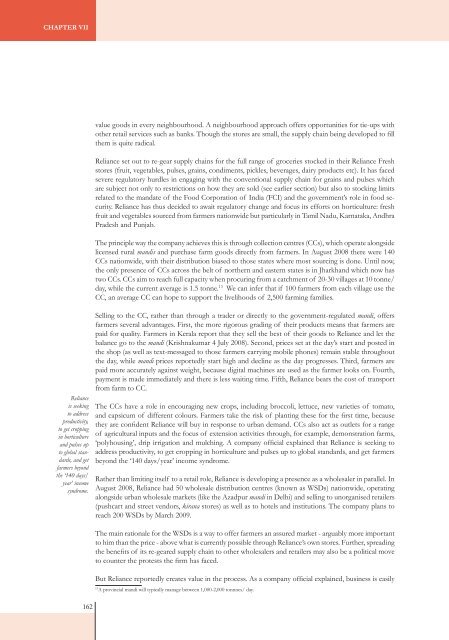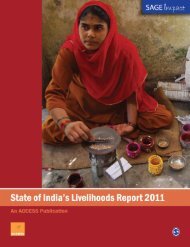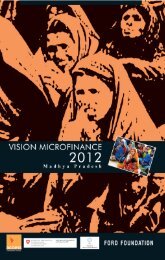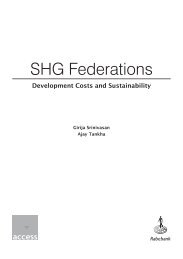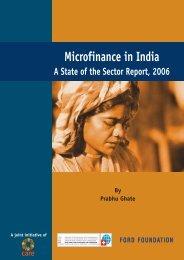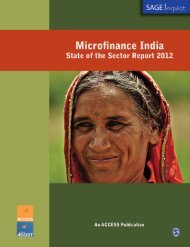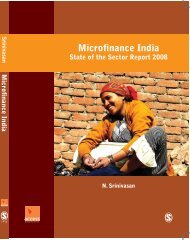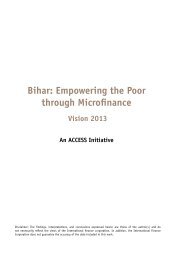Chapter VIIvalue goods in every neighbourhood. A neighbourhood approach offers opportunities for tie-ups withother retail services such as banks. Though the stores are small, the supply chain being developed to fillthem is quite radical.Reliance set out to re-gear supply chains for the full range of groceries stocked in their Reliance Freshstores (fruit, vegetables, pulses, grains, condiments, pickles, beverages, dairy products etc). It has facedsevere regulatory hurdles in engaging with the conventional supply chain for grains and pulses whichare subject not only to restrictions on how they are sold (see earlier section) but also to stocking limitsrelated to the mandate of the Food Corporation of India (FCI) and the government’s role in food security.Reliance has thus decided to await regulatory change and focus its efforts on horticulture: freshfruit and vegetables sourced from farmers nationwide but particularly in Tamil Nadu, Karnataka, AndhraPradesh and Punjab.The principle way the company achieves this is through collection centres (CCs), which operate alongsidelicensed rural mandis and purchase farm goods directly from farmers. In August <strong>2008</strong> there were 140CCs nationwide, with their distribution biased to those states where most sourcing is done. Until now,the only presence of CCs across the belt of northern and eastern states is in Jharkhand which now hastwo CCs. CCs aim to reach full capacity when procuring from a catchment of 20-30 villages at 10 tonne/day, while the current average is 1.5 tonne. 13 We can infer that if 100 farmers from each village use theCC, an average CC can hope to support the livelihoods of 2,500 farming families.Relianceis seekingto addressproductivity,to get croppingin horticultureand pulses upto global standards,and getfarmers beyondthe ‘140 days/year’ incomesyndrome.Selling to the CC, rather than through a trader or directly to the government-regulated mandi, offersfarmers several advantages. First, the more rigorous grading of their products means that farmers arepaid for quality. Farmers in Kerala report that they sell the best of their goods to Reliance and let thebalance go to the mandi (Krishnakumar 4 July <strong>2008</strong>). Second, prices set at the day’s start and posted inthe shop (as well as text-messaged to those farmers carrying mobile phones) remain stable throughoutthe day, while mandi prices reportedly start high and decline as the day progresses. Third, farmers arepaid more accurately against weight, because digital machines are used as the farmer looks on. Fourth,payment is made immediately and there is less waiting time. Fifth, Reliance bears the cost of transportfrom farm to CC.The CCs have a role in encouraging new crops, including broccoli, lettuce, new varieties of tomato,and capsicum of different colours. Farmers take the risk of planting these for the first time, becausethey are confident Reliance will buy in response to urban demand. CCs also act as outlets for a rangeof agricultural inputs and the focus of extension activities through, for example, demonstration farms,‘polyhousing’, drip irrigation and mulching. A company official explained that Reliance is seeking toaddress productivity, to get cropping in horticulture and pulses up to global standards, and get farmersbeyond the ‘140 days/year’ income syndrome.Rather than limiting itself to a retail role, Reliance is developing a presence as a wholesaler in parallel. InAugust <strong>2008</strong>, Reliance had 50 wholesale distribution centres (known as WSDs) nationwide, operatingalongside urban wholesale markets (like the Azadpur mandi in Delhi) and selling to unorganised retailers(pushcart and street vendors, kirana stores) as well as to hotels and institutions. The company plans toreach 200 WSDs by March 2009.The main rationale for the WSDs is a way to offer farmers an assured market - arguably more importantto him than the price - above what is currently possible through Reliance’s own stores. Further, spreadingthe benefits of its re-geared supply chain to other wholesalers and retailers may also be a political moveto counter the protests the firm has faced.But Reliance reportedly creates value in the process. As a company official explained, business is easily13A provincial mandi will typically manage between 1,000-2,000 tonnnes/ day.162
The Contribution of Corporate Supply Chains to the Livelihoods of the Poorcaptured from other mandi wholesalers in two ways. First, the firm offers buyers a better service: theminimum purchase required by Reliance is low at 2.5 kg; the company is more transparent in the weighingand pricing of the product; and goods are made available throughout the morning so that buyersdon’t have to reach at an unearthly hour to get the best stock. This means that even if it sells goodssourced from the mandi, Reliance adds value in service terms. On the other hand, Reliance does not sellon credit, but is seeking tie-ups with microfinance institutions that will offer loans to those listed byReliance as regular customers.But the more important benefit of purchasing through Reliance WSDs is in the quality of goods stockeddirectly from the farm. Better quality is made available at the same price because Reliance saves on theintermediary costs of the crowded and inefficient supply chain. Contrary to what is generally assumed,the bulk of CC-sourced produce is still kept for sale to unorganised retailers through WSDs, rather thanbeing sold through Reliance’s own stores.Not more than 60 per cent of goods sold in Reliance Fresh stores are actually sourced directly fromfarmers, the rest is sourced through the traditional, crowded supply chain. But Reliance also creates valuewhen it buys in bulk from mandis and then sorts the goods to attain a more refined grading system. Forinstance, only Grade A fruits are sent to its stores, and much of the balance, astonishingly, is sold backto the mandi at a discounted price (Sethi 13 July 2007).For the moment, the power of Reliance as a farm buyer is dissipated by the fact that most of the goodsit purchases directly from farmers are sold not through its stores but to a wide variety of buyers at themandis. Nonetheless, the grand plan can hardly be in doubt. “What we are excited about, and some peopleare worried about, is the consolidation in big retail that is sure to follow... Eventually only a handful willsurvive”, a company official told Frontline (Krishnakkumar 4 July <strong>2008</strong>). The article goes on, “As moreand more [farmers] prefer to ‘sell to the company’, [they] may find themselves at the mercy of a fewbig buyers who take only the best quality supplies from the cheapest sources and thus constantly pulldown prices, relegating those who cannot deliver, or deliver regularly, to ever-shrinking rural marketsthat trade mostly in second-grade produce” (Krishnakkumar 4 July <strong>2008</strong>, 39). But this grim forecast is,for the moment, surely out dazzled by the sheer enormity of the opportunity to sell more, of a vastlygreater range of goods, of higher quality.5.4. Pantaloon Retail IndiaFor themoment, thepower ofReliance asa farm buyeris dissipatedby the factthat mostof the goodsit purchasesdirectly fromfarmers are soldnot through itsstores but to awide variety ofbuyers at themandis.There are two different tales to the astonishing phenomenon of Pantaloon Retail. One is the early story(late 1970s to early 2000s) of the fabric and garment brand that was eventually cajoled into selling itsown goods; the other is the late story (2003 to present) when the garment brand got the retail bug andhas barely stood still long enough to look back up its supply chain.5.4.1. PantaloonsKishore Biyani started out branding his own fabric for men’s trousers. He’d purchase from textile millsand try to sell to garment manufacturers. Then he set up his own small unit and started designing andproducing his own fabric. By 1985, he was stitching his own trouser brand, while continuing to developnew fabrics from lesser known yarns. Acquiring experience with denim through a distributorship fromAhmedabad’s Arvind Mills, by the late 1980s, Biyani was set to launch a full-fledged garment brand.While production went smoothly, the business quickly faced problems getting its goods into stores. “Wewere trying to sell these trousers in various shops in Mumbai and it wasn’t an easy job… . A franchiseenetwork seemed to be an ideal way of ramping up our reach across the country”. The premises wouldbe owned and managed by the franchisee, and the stock, by Pantaloons. The first Pantaloon store wasopened thus in Goa in 1991.163
- Page 3 and 4:
State of India’s Livelihoods :The
- Page 5 and 6:
ChapterPage NoForeword 6Preface 8Ab
- Page 8:
ForewordAs a part of its microfinan
- Page 11 and 12:
employment growth, these sectors we
- Page 14:
RIAARMKRRBRSVYSCSC/STsSCPSCSPSERPSE
- Page 20 and 21:
Chapter Iresponse, risks and shocks
- Page 23 and 24:
OverviewTable 1.2 Employment and Un
- Page 25 and 26:
OverviewA recent paper by Arjun Sen
- Page 27:
Overview4. How is the livelihood st
- Page 31 and 32:
Overview5.2 Manmade constraints - i
- Page 33 and 34:
Overviewthe late 1980s, these two m
- Page 35 and 36:
OverviewIn the 1970s, the Chipko mo
- Page 37 and 38:
Overviewsocial responsibility (CSR)
- Page 39 and 40:
OverviewBox 1.3 Bihar - Underdevelo
- Page 42 and 43:
4040
- Page 44 and 45:
Chapter IIAn enumeration of the dep
- Page 46 and 47:
Chapter IIBox 2.1 Macro Level Livel
- Page 48 and 49:
Chapter IIIn addition to the above,
- Page 50 and 51:
Chapter IIFig 2.1: Poverty Ratio am
- Page 52 and 53:
Chapter IIPoormigrantlabouroften su
- Page 54 and 55:
Chapter IIInterestingly, the Govern
- Page 56 and 57:
Chapter IIThe effective cost of nat
- Page 58 and 59:
Chapter IIsector and thereby casual
- Page 60 and 61:
Chapter IIReferences1. Aiyar , Swam
- Page 62 and 63:
Chapter IIIto, the vulnerability co
- Page 64 and 65:
Chapter IIIIt would be useful here
- Page 66 and 67:
Chapter IIIof new employment opport
- Page 68 and 69:
Chapter IIIinterest subvention - wo
- Page 70 and 71:
Chapter III6. The 11th Plan propose
- Page 72 and 73:
Chapter IIIBox 3.5: Rural Business
- Page 74 and 75:
Chapter III9. The achievement of ge
- Page 76 and 77:
Chapter IIIaid. The Plan also seeks
- Page 78 and 79:
Chapter IIIand health. They point o
- Page 80 and 81:
Chapter IIIReferences1. Ambasta, Pr
- Page 82 and 83:
8080
- Page 84 and 85:
Chapter IVtransport, storage, commu
- Page 86 and 87:
Chapter IVing of ‘English Speakin
- Page 88 and 89:
Chapter IVWhile these livelihoods h
- Page 90 and 91:
Chapter IVTable 4.6 Employment with
- Page 92 and 93:
Chapter IVConstruction requires no
- Page 94 and 95:
Chapter IVgains in manufacturing ha
- Page 96 and 97:
Chapter IV10. A Spatial Perspective
- Page 98 and 99:
Chapter IVA quick glance at some of
- Page 100 and 101:
Chapter IV12. Once a watershed is d
- Page 102:
Chapter IVThrougha range ofschemes
- Page 105 and 106:
Public Systems: Major central gover
- Page 107 and 108:
Public Systems: Major central gover
- Page 109 and 110:
Public Systems: Major central gover
- Page 111 and 112:
Public Systems: Major central gover
- Page 113 and 114: Public Systems: Major central gover
- Page 115 and 116: Public Systems: Major central gover
- Page 117 and 118: Public Systems: Major central gover
- Page 119 and 120: Public Systems: Major central gover
- Page 121 and 122: Public Systems: Major central gover
- Page 123 and 124: Public Systems: Major central gover
- Page 125 and 126: Public Systems: Major central gover
- Page 127 and 128: Public Systems: Major central gover
- Page 129 and 130: Public Systems: Major central gover
- Page 131 and 132: Public Systems: Major central gover
- Page 133 and 134: Civil Society InitiativesChapter VI
- Page 135 and 136: Civil Society InitiativesThe human
- Page 137 and 138: Civil Society Initiativesso far has
- Page 139 and 140: Civil Society Initiativesan 8 per c
- Page 141 and 142: Civil Society InitiativesThe cooper
- Page 143 and 144: Civil Society Initiativeslimited ir
- Page 145 and 146: Civil Society Initiativesintelligen
- Page 147 and 148: Civil Society InitiativesOutboard M
- Page 149 and 150: Civil Society InitiativesCase Study
- Page 151 and 152: Civil Society InitiativesReferences
- Page 153 and 154: The Contribution of Corporate Suppl
- Page 155 and 156: The Contribution of Corporate Suppl
- Page 157 and 158: The Contribution of Corporate Suppl
- Page 159 and 160: The Contribution of Corporate Suppl
- Page 161 and 162: The Contribution of Corporate Suppl
- Page 163: The Contribution of Corporate Suppl
- Page 167 and 168: The Contribution of Corporate Suppl
- Page 169 and 170: The Contribution of Corporate Suppl
- Page 172 and 173: Chapter VIII170
- Page 174 and 175: Chapter VIIIcountry that make the e
- Page 176 and 177: Chapter VIIIFig 8.4: All-India area
- Page 178 and 179: Chapter VIIIWhen commercial crops l
- Page 180 and 181: Chapter VIIIunit of risk settlement
- Page 182 and 183: Chapter VIIIPublic capitalformation
- Page 184 and 185: Chapter VIII8. Integrated Rural Dev
- Page 186 and 187: Chapter VIIIAn expertpanel ‘sreco
- Page 188 and 189: Chapter VIIIHowever as final wage s
- Page 190: 188
- Page 193 and 194: appENDIX TableTable A.1.3: Distribu
- Page 195 and 196: appENDIX TableEmploymentEmploymentG
- Page 197 and 198: appENDIX TableTable 2: Employment S
- Page 199 and 200: appENDIX TableTable 4: State Wise G
- Page 201 and 202: appENDIX TableTable-7: Distribution
- Page 203 and 204: appENDIX TableDams and Displacement
- Page 205 and 206: appENDIX TableFig. A.3.2: High Pote
- Page 207 and 208: appENDIX TableTable A.3.2Table 2: S
- Page 209 and 210: appENDIX TableChapter IV - ANNEX TA
- Page 211 and 212: appENDIX TableAnnex A.5.1Backward R
- Page 213 and 214: appENDIX TableAnnex A.5.3Some UNDP
- Page 215 and 216:
appENDIX TableGross Value of Output
- Page 217 and 218:
Mona DikshitMona Dikshit has been a


